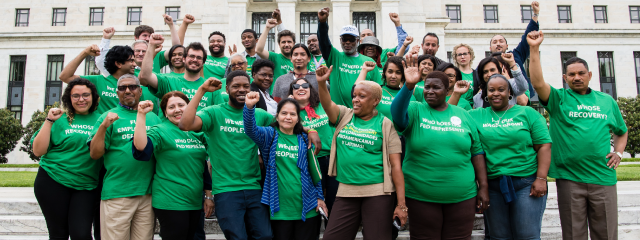What Could Immigration Reform Mean to Community-Based Organizations? Growth, Leaders & Power

Chris Huang --
In the summer of 2012, President Obama signed a memo deferring deportation for eligible undocumented youth who immigrated as children. This program, called Deferred Action for Childhood Arrivals (DACA), immediately resulted in a flood of traffic to community-based organizations around the country, as individuals sought information on eligibility and assistance on the application process from the people they trust the most.
As an illustration of the scale involved, one community-based organization in California initially experienced lines around the block, requiring all staff to pitch in to help. About 120 people were coming into their offices per hour. In the first few months, 70,000 to 80,000 people had come through their doors seeking information or application assistance. Out of this number, 2,000 applications were processed and 2,500 became members. The program is now generating revenue to not only pay for itself but also help support the organization’s other programs.
This experience is the tip of the iceberg of what other community-based organizations will face if and when common sense immigration reform becomes law and is indicative of both the enormous potential opportunities and challenges.
The Migration Policy Institute estimates that up to 1.76 million undocumented immigrants were eligible for DACA. Many estimate that up to 11 million people could be affected by the current immigration reform legislation.
The magnitude of this event creates an urgency for community-based organizations to develop the organizational capacity to not only meet the demand for information and naturalization or eligibility screening services, but to also to help build relationships with and drive the millions of immigrants into collective action to fight for the many other civil rights and economic justice issues that affect them day to day and to continue the hard work of social transformation well into the future.
With this in mind, CPD has partnered with the National Domestic Workers Alliance (NDWA) to launch the Basebuilders Innovation Group (the Get BIG! program), an ambitious project that combines sophisticated organizing and leadership development support with emerging technology and systems to bolster the organizing capacity and internal infrastructure of NDWA affiliates and create the foundation from which they can increase the scale of their organizing.
NDWA is powered by 39 local, membership-based affiliate organizations of over 10,000 nannies, housekeepers and caregivers of the elderly located in 14 states, plus the District of Columbia. The inaugural cohort of Get BIG! consists of twelve NDWA affiliates selected to participate in an intensive 18-month organizing and leadership development collaborative that will include in-person trainings, monthly peer-to-peer discussion and coaching, and ongoing technical assistance and support. In addition, participants in BIG will go through a guided process of assessing and revamping their technological infrastructure, database systems and internal workflows to better leverage new technology for membership development and growth.
CPD is working closely with the 12 NDWA affiliates in the Get BIG! program to evaluate each organization’s base-building opportunities within the context of immigration reform and help them develop the technological capacity and internal processes needed to serve the thousands of new individuals who will be coming to affiliates’ doors seeking assistance related to legalization and, ultimately, to leverage new technologies and systems to connect thousands of immigrants and workers to the NDWA membership, wrap-around services, and advocacy efforts.












